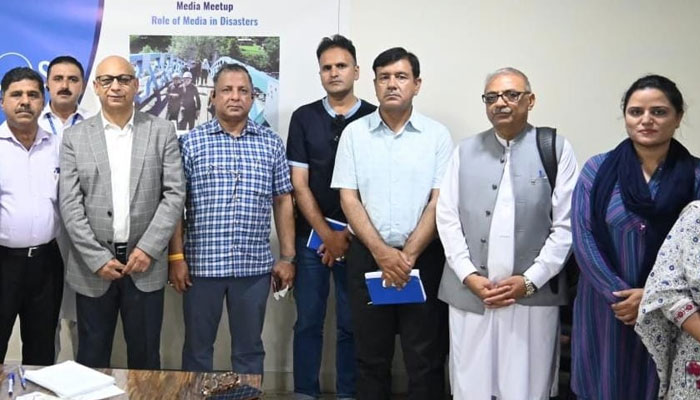Media, NGOs to strengthen partnership for better disaster response in Pakistan
Islamabad:Secours Islamique France (SIF) Pakistan Mission successfully organised a Media Meetup focused on the crucial role of media in disaster reporting and response. The event, held at the SIF Office, brought together esteemed media persons and representatives from SIF to discuss and address key issues related to disaster management and the media’s role in shaping effective disaster response strategies.
Nasir Malik, media coordinator at SIF, opened the discussion, and Dr. Altaf Abro, Head of Mission, welcomed journalists. Dr. Abro emphasised the need for increased cooperation between media and NGOs to enhance disaster reporting and response, highlighting SIF's role since 2012. He stressed the media's role in policy shaping and the importance of collaboration for greater visibility and beneficiary reach.
Feroza Zahra, head of Programme, detailed SIF’s disaster management since 2010, focusing on the 2023 floods across 33 districts. She highlighted projects in WASH, food security, livelihoods, education, child welfare, shelter, climate change, and disaster risk reduction. She also noted NDMA's identification of 38 high-risk districts for the upcoming Monsoon rains.
Critical Points Discussed by media journalists: Accessibility Issues in Balochistan: Dr. Altaf discussed the challenges of reaching remote areas and the necessity for collaboration with other institutions. He cited the Lasbela incident as an example where accessibility was severely hindered, emphasising the need for focused rehabilitation and mitigation efforts.
Media’s role in pre-disaster reporting: Gohar Ali from Jang and other senior journalists highlighted the media's tendency to report post-disaster. They advocated for enhanced pre-disaster reporting and suggested collaboration to raise awareness before disasters occur. The discussion emphasized the need for training reporters in disaster journalism and improving coordination between NGOs and media.
Data sharing and methodology: PTV Waqar emphasised the importance of real-time data for effective media reporting was underscored. Journalists emphasized the need to validate data and credit the source organization. Training journalists on media ethics and conducting simulation exercises were also recommended.
Risk area identification for 2024: Ongoing efforts in training CERT (Community Emergency Response Team) teams and identifying major risk-prone areas were discussed. Collaboration with Provincial and District Disaster Management Authorities (PDMA and DDMA) was highlighted. Support for climate-hit communities: Dr. Altaf detailed SIF’s focus on saving lives and empowering women through training and cash-for-work programs, especially in climate-affected communities.
Awareness and pre-planning: Dr. Sadia Kamal raised concerns about low awareness levels despite extensive activism. She criticized the focus on photo ops rather than meaningful projects in vulnerable areas.
Coordination and data authenticity: The need for improved coordination between media and civil society was discussed. Reliable data, often sourced from NDMA, is crucial, and the media's role as a pressure group for the government was emphasised.
Media access and security: The disparity in access given to international vs. local media was highlighted. SIF explained the need to avoid causing panic and mentioned existing restrictions.
Agreed points and action items: Improve coordination between media and NGOs. Enhance pre-disaster awareness and reporting. Validate and share data responsibly. Conduct training and simulation exercises for journalists. Ensure inclusive and meaningful project implementations in vulnerable areas.
The event concluded with a consensus on the need for closer collaboration between media and humanitarian organisations to improve disaster response and build resilience in Pakistan’s most vulnerable communities.
-
 Mexico’s President Considers Legal Action Over Elon Musk Cartel Remark
Mexico’s President Considers Legal Action Over Elon Musk Cartel Remark -
 Prince William Hits The Roof With The Andrew Saga Bleeding Into Earthshot
Prince William Hits The Roof With The Andrew Saga Bleeding Into Earthshot -
 HBO Gives Major Update About 'Industry' Season Five And Show's End
HBO Gives Major Update About 'Industry' Season Five And Show's End -
 Donnie Wahlberg Responds To 'Boston Blue' Backlash: 'Nobody Was More Disappointed Than Me'
Donnie Wahlberg Responds To 'Boston Blue' Backlash: 'Nobody Was More Disappointed Than Me' -
 Jennifer Garner Gets Emotional Over Humble Career Start: 'It Makes Me Want To Cry'
Jennifer Garner Gets Emotional Over Humble Career Start: 'It Makes Me Want To Cry' -
 Princess Beatrice Told An Acquaintance That She ‘likes’ Jeffrey Epstein: Grim Verdict Drops
Princess Beatrice Told An Acquaintance That She ‘likes’ Jeffrey Epstein: Grim Verdict Drops -
 Late Katherine Short's Neighbours Give Insights Into Her 'peace Loving' Personality Post Suicide
Late Katherine Short's Neighbours Give Insights Into Her 'peace Loving' Personality Post Suicide -
 Fresh Details Of King Charles, Queen Camilla's US Visit Emerge Amid Andrew Investigation
Fresh Details Of King Charles, Queen Camilla's US Visit Emerge Amid Andrew Investigation -
 Iran 'set To Buy' Chinese Carrier-killer Missiles As US Forces Gather In Region
Iran 'set To Buy' Chinese Carrier-killer Missiles As US Forces Gather In Region -
 Prince Harry And Meghan Unlikely To Meet Royals In Jordan
Prince Harry And Meghan Unlikely To Meet Royals In Jordan -
 Hero Fiennes Tiffin Shares Life-changing Advice He Received From Henry Cavill
Hero Fiennes Tiffin Shares Life-changing Advice He Received From Henry Cavill -
 Savannah Guthrie's Fans Receive Disappointing News
Savannah Guthrie's Fans Receive Disappointing News -
 Prince William Steps Out For First Solo Outing After Andrew's Arrest
Prince William Steps Out For First Solo Outing After Andrew's Arrest -
 Jake Paul Chooses Silence As Van Damme Once Again Challenges Him To Fight
Jake Paul Chooses Silence As Van Damme Once Again Challenges Him To Fight -
 Google Disrupts Chinese-linked Hacking Groups Behind Global Cyber Attacks
Google Disrupts Chinese-linked Hacking Groups Behind Global Cyber Attacks -
 Four People Killed In Stabbing Rampage At Washington Home
Four People Killed In Stabbing Rampage At Washington Home




